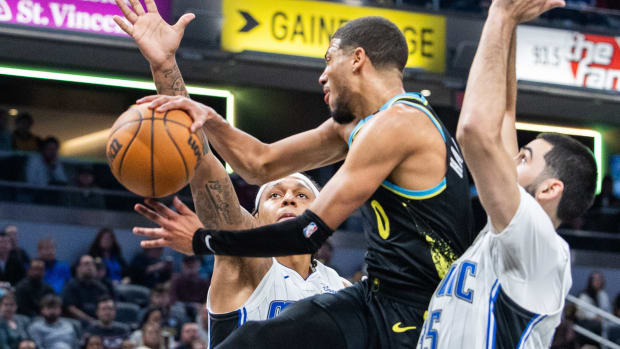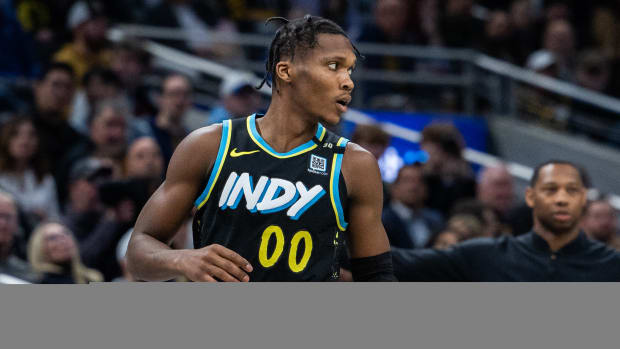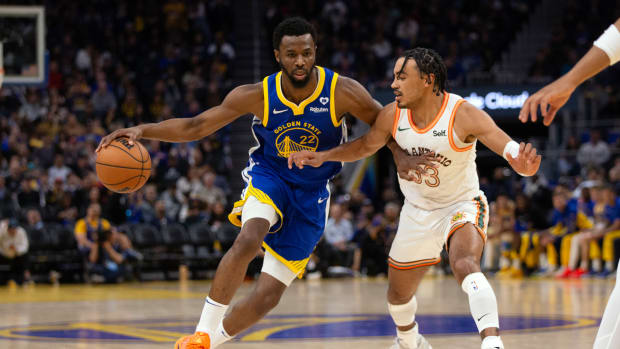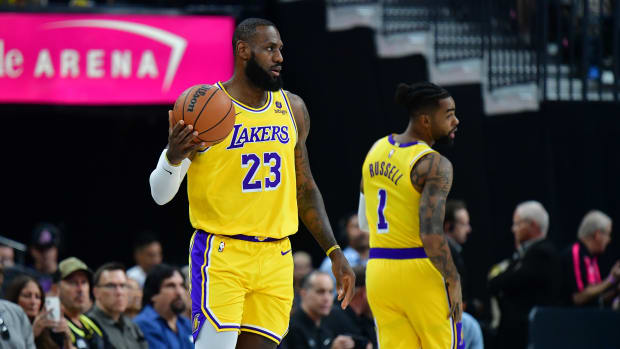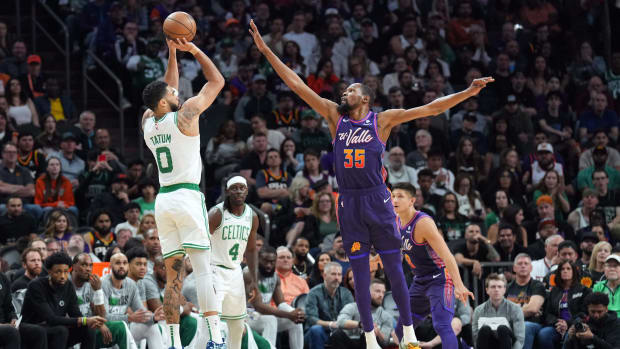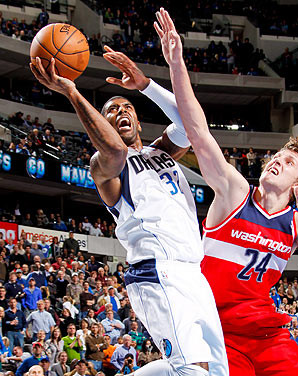
Mayo coming into his own for a Dallas team in need of star power
O.J. Mayo heard about Nowitzki's unorthodox travel itinerary, and when he signed with the Mavericks this summer, asked to mimic it. Trainer Casey Smith calls ahead and makes sure an arena door is left open. Assistant coach Darrell Armstrong tags along. Unless the Mavs land late, or are on a back-to-back, Mayo and Armstrong ride together and shoot for an hour. "It's a way to make sure you're comfortable on the court," Mayo said. "It's a way to stay sharp."
A true superstar lifts a franchise even when injured. Nowitzki underwent knee surgery in October. He hasn't played a game all season. He probably won't until January. But the Mavericks are still his team and Mayo has been pushed by his presence. The airport-to-arena workout is not mandatory for Mavs stars, but Nowitzki made it part of the organizational fabric, and Mayo has become an important thread.
After four discouraging years in Memphis, where his numbers dwindled and his starting job disappeared, Mayo is an early revelation in Dallas. He is averaging a career-high 20.8 points per game, but that's not surprising, since the Mavericks current starting lineup includes Derek Fisher, Dahntay Jones and Brendan Wright, and someone has to score. More impressive, Mayo is shooting 48.7 percent from the floor and a league-leading 53 percent from three-point range, a sign that he's not just chucking anymore. Mayo is putting up eight points more than last season and his percentages have increased by eight points from the field, 16.6 from three.
GOLLIVER: Award leaders at the quarter mark of 2012-13 season
Mayo scored 40 in Houston on Saturday, the first time he's reached that threshold in three years, and the only way Sacramento could stop him Monday was with a DeMarcus Cousins shot to the groin. At 11-10, the Mavericks are no contenders, but Mayo is keeping the door to the playoffs open until Nowitzki returns. "The West is a slaughterhouse," said Mavericks president Donnie Nelson. "All along, we were like, 'If we can hang in there until the German infantry comes back, we'll be in good shape.' We're holding serve."
In the past 18 months, Dallas has gone from the Finals to the fringes. Tyson Chandler and Caron Butler left, followed by Jason Kidd and Jason Terry, and the salary cap space that was supposed to be spent on Deron Williams went unused. The summer was a disappointment for the Mavericks, as well as for Mayo, who didn't land the long-term contract he sought. "We went through the same drill he did, hoping for scenario A and getting scenario C," Nelson said. "It was a match made in heaven."
It was also a match made by the new collective bargaining agreement. Memphis could not afford to keep Mayo as a sixth man and other teams could not afford to pay him like a cornerstone. The Mavericks, who haven't been in the lottery in 12 years, viewed Mayo as the kind of high-ceilinged prospect they never get a chance to draft. Nelson was enamored with Mayo when he came out of USC in 2008, but the Mavs first pick that year was No. 51. Mayo went third.
MAHONEY: Alternative awards for the first quarter of the NBA season
The '08 draft was among the most significant in recent history. Derrick Rose, Russell Westbrook and Kevin Love were all taken in the top five, but so was Michael Beasley, already on his third team. Mayo was neither phenomenon nor flop, a natural scorer relegated to the second unit in Memphis because Zach Randolph, Marc Gasol and Rudy Gay had to eat first. "It was cool because it helped our bench get better and it helped our team win," Mayo said. "But I feel I'm a starter in this league."
Today's NBA is full of young players who seize headliner roles, but when Nelson studied Mayo's first four years he was reminded of Steve Nash, who didn't average more than 10 points and seven assists until his fifth season and third in Dallas. "Every guy has a different gestation period," Nelson said. Nash benefited from Nowitzki and so would Mayo. Although the Mavericks were not going to offer a long-term deal, they could guarantee a starting spot and a demanding coach. Chauncey Billups, another former No. 3 pick who sputtered at the outset, told Mayo that Rick Carlisle was crucial to kick-starting his career in Detroit. Mayo hoped Carlisle could do the same for him and signed a two-year, $8 million contract in mid-July.
Without Nowitzki, the Mavericks need Mayo to shoot, but Carlisle is pushing him to do everything else, too, and he is averaging career-highs in rebounds and assists. "From day one we've worked on footwork, getting open off the ball, going hard on the defensive end," Mayo said. "The game is slowing down for me. I'm getting more patient -- seeing the big man rolling, reading the defense and making the best play for my team."
The Mavericks roster can look like a way-station for veterans passing through -- Darren Collison, Chris Kaman, Elton Brand and Jones are all new acquisitions who will be free agents next July -- but Nelson insists that isn't so. Of course, the Mavs are maintaining cap space in case another superstar comes on the market, and every Lakers loss makes Dwight Howard appear more available. "But there are no more A, B, C, D, E plans," said Nelson. "Mark [Cuban] has been pretty adamant: Yes, we are flexible, but our first priority is to look within rather than chase lightning in a bottle."
Nelson sees Mayo as a linchpin, not a placeholder. "O.J. is a huge component of what we're doing," he said. "We're hoping to keep him in a Maverick uniform for a long time. We'd welcome that conversation, of keeping him here long-term, but it's a summer conversation."
For now, the Mavericks are just trying to keep the back door propped open, in hopes that Nowitzki and Mayo eventually walk through it together.






























